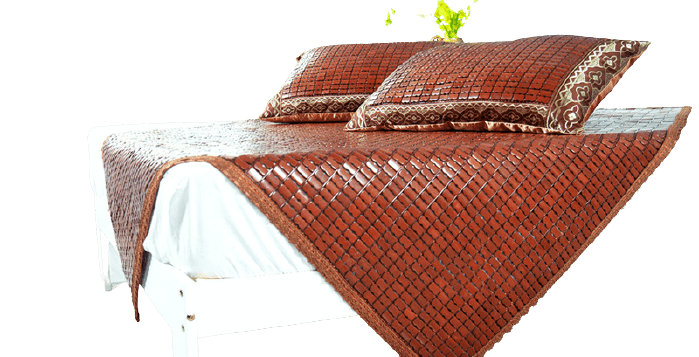Key Takeaways
| Aspect | Detail |
|---|---|
| Definition | Carbonized bamboo is high-heat treated bamboo, offering a darker hue. |
| Manufacturing Process | Involves high-temperature heating, removing moisture and organic materials. |
| Durability | Varies; often more durable than natural bamboo, with some exceptions. |
| Aesthetics | Provides a unique, darker color, differentiating it from natural bamboo. |
| Uses | Ideal for flooring, decor, and more due to its versatility and appearance. |
Carbonized bamboo represents a fascinating innovation in the realm of sustainable materials. This unique material, prominently featured in products like bamboo mahjong mats, has garnered attention for its distinctive characteristics and eco-friendly nature. But what exactly is carbonized bamboo, and how does it stand out from its natural counterpart?
Understanding Carbonized Bamboo
Carbonized bamboo is essentially natural bamboo that has undergone a specialized treatment process. This process involves subjecting the bamboo to high heat, effectively caramelizing its fibers. The result? A beautifully rich, darker color that mimics the appearance of natural woods like oak or teak, making it a popular choice for flooring and various other products.
The Carbonization Process
The manufacturing process of carbonized bamboo is quite intriguing. It begins with heating bamboo at temperatures significantly higher than those used in standard bamboo processing. This method does more than just alter the bamboo's hue; it also impacts its physical properties.
The removal of moisture and organic materials during carbonization is a crucial step. Not only does it affect the color, but it also influences the bamboo's size and structure. Interestingly, bamboo can shrink by up to 17% during this process due to moisture evaporation.
Durability and Versatility
One might wonder about the durability of carbonized bamboo, especially when considering its use in products like bamboo mahjong mats. Surprisingly, carbonized bamboo is known for its robustness, often being more durable than natural bamboo. However, it's important to note that not all carbonized bamboo products share the same level of durability. The process can make some types of carbonized bamboo softer and more susceptible to water absorption than others.
Despite these variations, carbonized bamboo remains a top choice for many due to its versatility. Its ability to blend with various home décor styles makes it a go-to material for interior designers and homeowners alike.
Price and Environmental Impact
When discussing carbonized bamboo, it's essential to consider its cost-effectiveness and environmental footprint. While it is generally more expensive than natural bamboo, the price can vary depending on the specific benefits and features offered by the carbonization process.
In terms of sustainability, carbonized bamboo provides a greener alternative to traditional hardwood materials. Its production process, although intensive, still adheres to eco-friendly standards, making it a conscientious choice for those looking to reduce their environmental impact.
Comparison with Natural Bamboo
To appreciate the uniqueness of carbonized bamboo, a comparison with natural bamboo is insightful. Natural bamboo is lighter in color and highly durable, suitable for areas like kitchens and bathrooms due to its water resistance. In contrast, carbonized bamboo, with its darker hue and aesthetic appeal, is more suited for living spaces and less humid environments.
Aesthetic Appeal and Home Decor Integration
Carbonized bamboo's aesthetic appeal cannot be overstated. Its rich, dark color offers a sophisticated and upscale appearance, a stark contrast to the lighter, more natural tone of untreated bamboo. This makes it an excellent choice for those looking to add a touch of elegance to their home interiors. The versatility of carbonized bamboo in blending with various decor styles is one of its most celebrated attributes. Whether it's for flooring, furniture, or decorative items, carbonized bamboo seamlessly integrates into any space, adding both functionality and style.
Health and Safety Considerations
When it comes to health and safety, carbonized bamboo is an excellent choice. The process of carbonizing bamboo doesn't involve any harmful chemicals, making it a safe option for use in homes and workplaces. Furthermore, its natural composition ensures that it doesn't emit volatile organic compounds (VOCs), which are commonly associated with synthetic building materials. For those concerned about the safety aspects of carbonized bamboo, more detailed information can be found on our safety page.
Waterproof and Humidity Resistance
While carbonized bamboo isn't entirely waterproof, it does offer significant resistance against moisture, more so than natural bamboo. This makes it a suitable choice for areas that are prone to spills or humidity, though it's still advisable to avoid using it in places with prolonged exposure to moisture. For those interested in learning more about the waterproof characteristics of carbonized bamboo and how it compares to other materials, our waterproof carbonized bamboo page offers comprehensive insights.
Economic and Environmental Impact
From an economic standpoint, carbonized bamboo presents a cost-effective alternative to traditional hardwoods. Although initially more expensive than natural bamboo, its durability and aesthetic appeal often justify the investment over time. Additionally, the use of carbonized bamboo supports sustainable forestry practices, as bamboo is a rapidly renewable resource. This not only reduces the environmental impact but also contributes to the conservation of hardwood forests.
Summary and Next Steps
Carbonized bamboo stands as a testament to the innovative use of natural resources in creating sustainable, durable, and aesthetically pleasing materials. Whether it's for home improvement, commercial spaces, or artistic endeavors, carbonized bamboo offers a versatile solution that balances beauty, functionality, and environmental responsibility.
For those looking to dive deeper into the world of bamboo products, About Us provides more information on our journey and commitment to sustainability. If you're ready to explore our range of products, head over to our product page. For any inquiries or assistance, our team is always available at contact.
Applications of Carbonized Bamboo in Modern Design
Carbonized bamboo's unique properties have led to its wide application in various aspects of modern design. Its aesthetic appeal and durability make it a popular choice for high-end apartments and office spaces. The material is commonly used in flooring, furniture, and even in creating unique items like bamboo mahjong mats. Its versatility also extends to the manufacturing of stand-woven products, which are known for their extra strength and resilience.
Care and Maintenance
Maintaining carbonized bamboo products is relatively straightforward, but it does require some attention to ensure their longevity. Regular cleaning with a soft, damp cloth can help maintain its appearance. It's also important to avoid prolonged exposure to moisture and direct sunlight, as these can affect the color and integrity of the material. For those interested in the manufacturing process of these products, further information is available on how bamboo mahjong mats are made.
Environmental Considerations
Carbonized bamboo is not only stylish and durable but also an environmentally friendly choice. Bamboo is a highly renewable resource, growing much faster than traditional hardwood trees. By choosing carbonized bamboo, consumers contribute to reducing the demand for hardwood, thereby aiding in forest conservation efforts.
Future of Carbonized Bamboo
The future of carbonized bamboo looks promising, with continuous innovations in manufacturing processes and applications. As sustainability becomes a more pressing concern globally, materials like carbonized bamboo are likely to gain even more popularity. Their ability to merge aesthetic appeal with environmental responsibility makes them a logical choice for future construction and design projects.
Carbonized Bamboo: A Symbol of Sustainable Innovation
Carbonized bamboo stands as a beacon of sustainable innovation in the world of modern materials. Its unique combination of aesthetic appeal, durability, and eco-friendliness makes it a compelling choice for various applications, from stylish home decor to robust commercial installations.
Embracing Carbonized Bamboo in Everyday Life
As society moves towards more sustainable living practices, carbonized bamboo offers an excellent opportunity to incorporate eco-friendly materials into our daily lives. Its use in products like bamboo mahjong mats exemplifies how traditional items can be reimagined using sustainable materials.
The Road Ahead for Carbonized Bamboo
The increasing demand for eco-friendly and sustainable materials is likely to propel the growth of carbonized bamboo in various sectors. This material not only represents a shift towards greener choices but also reflects a deeper appreciation for the beauty and versatility of natural materials.
Final Thoughts
Carbonized bamboo is more than just a material; it's a testament to the possibilities of sustainable living and design. Its unique properties and applications demonstrate how innovation and environmental responsibility can go hand in hand. For anyone interested in exploring the diverse range of carbonized bamboo products and our commitment to sustainability, we invite you to visit our product page. For more information about our practices and values, the About Us section provides a deeper insight. And for any queries or support, our team is ready to assist you through our contact page.



